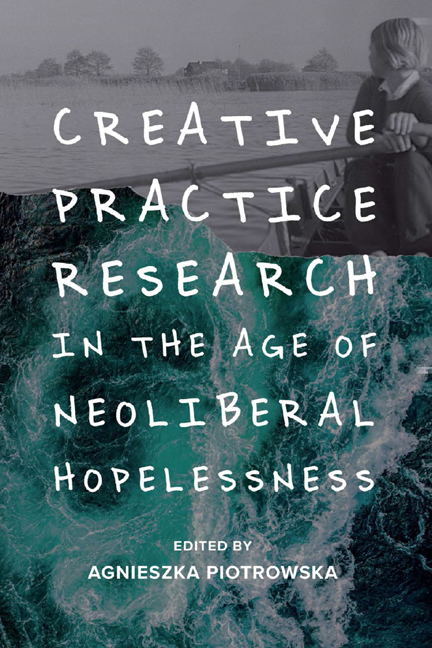Book contents
- Frontmatter
- Contents
- List of Figures
- Notes on Contributors
- Acknowledgements
- Preface: Life in the Post Pandemic Age
- Dedication
- 1 Introduction: Complexities, Compromises and Complicities
- 2 Against the Grain: Women Film Practitioners and Theorists Talk Creative Practice and Theory
- 3 Married to the Eiffel Tower: Notes on Love, Loss and Knowledge
- 4 Creativity and Neoliberalism: Between Autonomy, Resistance and Tactical Compliance
- 5 Tactical Compliance and the Persistence of Elsaesser
- 6 Storytelling and Game Playing
- 7 Autonomy and the Other Woman: Queer Active Agency and Postcolonial Expectations
- 8 From Neolithic to Neoliberal
- 9 First-person Expression on ‘Non-Western’ Screens: China as a Case Study
- 10 Scholarly Exploration of the Creative Process: Integrating Film Theory and Practice
- 11 Teaching Practice as Theory: Guerrilla Filmmaking
- 12 Baits of Falsehood: The Role of Fiction in Documentary or From Untheorised Practice to Unpractised Theory
- 13 Repented: A Creative Intersemiotic Translation
- Notes on Repented
- 14 How do you see me? The Camera as Transitional Object in Diasporic, Domestic Ethnography
- 15 ‘Shut Your Hole, Girlie. Mine's Making Money, Doll’: Creative Practice-Research and the Problem of Professionalism
- 16 Feminist ‘Pensive-creative Praxis’ and Irigaray: A Porous, Dialogical Encounter
- 17 The Paths of Creation, or How Can I Help my Dybbouk to Get Out of Me?
- 18 ‘We Want to Kill Boko Haram’: Reflections on the Photographic Representation of Children in a Displacement Camp
- 19 Between ‘Counter-movement’ (Ingold) and ‘Living with Ghosts’ (Demos)
- 20 Screen Memories: A Video Essay on Smultronstället/Wild Strawberries
- Index
5 - Tactical Compliance and the Persistence of Elsaesser
Published online by Cambridge University Press: 17 October 2020
- Frontmatter
- Contents
- List of Figures
- Notes on Contributors
- Acknowledgements
- Preface: Life in the Post Pandemic Age
- Dedication
- 1 Introduction: Complexities, Compromises and Complicities
- 2 Against the Grain: Women Film Practitioners and Theorists Talk Creative Practice and Theory
- 3 Married to the Eiffel Tower: Notes on Love, Loss and Knowledge
- 4 Creativity and Neoliberalism: Between Autonomy, Resistance and Tactical Compliance
- 5 Tactical Compliance and the Persistence of Elsaesser
- 6 Storytelling and Game Playing
- 7 Autonomy and the Other Woman: Queer Active Agency and Postcolonial Expectations
- 8 From Neolithic to Neoliberal
- 9 First-person Expression on ‘Non-Western’ Screens: China as a Case Study
- 10 Scholarly Exploration of the Creative Process: Integrating Film Theory and Practice
- 11 Teaching Practice as Theory: Guerrilla Filmmaking
- 12 Baits of Falsehood: The Role of Fiction in Documentary or From Untheorised Practice to Unpractised Theory
- 13 Repented: A Creative Intersemiotic Translation
- Notes on Repented
- 14 How do you see me? The Camera as Transitional Object in Diasporic, Domestic Ethnography
- 15 ‘Shut Your Hole, Girlie. Mine's Making Money, Doll’: Creative Practice-Research and the Problem of Professionalism
- 16 Feminist ‘Pensive-creative Praxis’ and Irigaray: A Porous, Dialogical Encounter
- 17 The Paths of Creation, or How Can I Help my Dybbouk to Get Out of Me?
- 18 ‘We Want to Kill Boko Haram’: Reflections on the Photographic Representation of Children in a Displacement Camp
- 19 Between ‘Counter-movement’ (Ingold) and ‘Living with Ghosts’ (Demos)
- 20 Screen Memories: A Video Essay on Smultronstället/Wild Strawberries
- Index
Summary
This essay considers Thomas Elsaesser's debut film, Die Sonneninsel/The Sun Island (Germany, 2017), in particular in light of the concept of ‘tactical compliance’, which Elsaesser himself developed during his keynote paper, reproduced herein, at the Creative Practice Research in the Age of Neoliberal Hopelessness Conference at the University of Bedfordshire on 11 May 2018. The aim is to work through what tactical compliance might mean in the age of neoliberal hopelessness – and in some senses to take issue with the concept. I shall do this by situating The Sun Island within the context of Elsaesser's own theoretical work, in particular his understanding of the so-called Persistence of Hollywood (2012), which itself springs perhaps from his contribution to Vivian Sobchack's edited collection on The Persistence of History (1997). The aim is not to produce an ad hominem ‘attack’ on Elsaesser and his work, but to understand tactical compliance as a means towards persistence, while also relating persistence to systems of power. In other words, the ideas of Elsaesser will be linked to Elsaesser-as-idea (as author, as filmmaker), with no real concern for Elsaesser-as-man (if that is how he would define himself and/or if that is what Elsaesser is).
What follows will nonetheless seem to conflate the personal with the political because The Sun Island is in some senses a deeply personal film. The film is primarily about the rehabilitation of the reputation of the filmmaker’s grandfather, Martin Elsaesser, an architect who played a significant role in the design of Frankfurt between 1925 and 1932, and whose most famous work, the city's Grosmarkthalle, or Central Market, was to be destroyed to make way for the new headquarters of the European Central Bank in the first part of the twenty-first century. However, the film also is a consideration of the Elsaessers's family history – including perhaps most significantly the relationship between the filmmaker's grandmother, Liesel, and landscape designer Leberecht Migge. Migge, whom Elsaesser has referred to elsewhere as ‘something like the Grandfather of the German Green movement’ (Elsaesser 2009a: 47) is the person mainly responsible for the titular Sun Island, which started out in 1932 as a kind of project for sustainable living, where inhabitants would be able to survive without the interference of the modern world.
- Type
- Chapter
- Information
- Publisher: Edinburgh University PressPrint publication year: 2020



